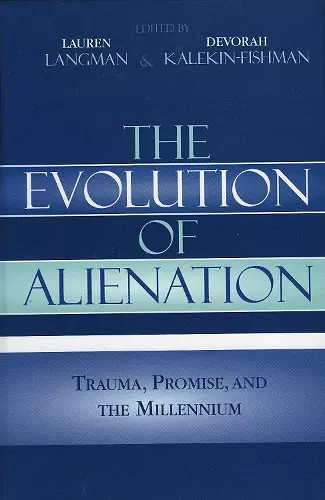The Evolution of Alienation
Trauma, Promise, and the Millennium
Devorah Kalekin-Fishman editor Lauren Langman editor
Format:Hardback
Publisher:Rowman & Littlefield
Published:8th Dec '05
Currently unavailable, and unfortunately no date known when it will be back
This hardback is available in another edition too:
- Paperback£47.00(9780742518353)

The Evolution of Alienation: Trauma, Promise and the Millennium presents a collection of essays that examine the prevalence of alienation in the contemporary world. Although the authors share a critical approach to society, their views of alienation vary. While some feel that alienation is inescapable under the conditions of late modernity, others see that especially at this time there are opportunities to overcome alienation. Testing their approaches, the authors touch on highly diverse domains of life. The book is divided into four sections, each with a focus on how alienation is produced and, perhaps, overcome. Part I presents theoretical approaches to 'shifting views of alienation'. Here the authors discuss how alienation is disclosed in social science, in technology, and in biological constructions of the human being. Part II deals with political consequences of alienation. The three chapters focus on how alienation can lead to fascist beliefs, how it functions in the development of authoritarian personalities, and how alienation is disclosed in teen-age violence, but also in the justice meted out to desperate teens, without compassion. Part III includes examinations of 'alienation in identity, culture, and religion'. Here, researchers discuss how the alienating conditions of globalization create alienated identities that are carnivalized in shock music and in exploitative television shows. The last chapter of this section sees in these developments evidence of our inability or unwillingness as social scientists to deal with transcendental values. Part IV focuses on phenomena from everyday life, showing how alienation undermines the advantages of community, and the intimacies of dialogue. Although the very concern with alienation shows awareness of trauma, there are, throughout the book, hints of promise - in technology, in loving and creative domesticity, in activism and through grass-roots initiatives in education. Through an interest in the cosmos human being may yet discover the way out of alienating labyrinths.
The Evolution of Alienation takes account of the postmodern debate and the rejection in recent years of the concept of alienation, critiques that rejection, and makes a strong argument for the relevance for today of a broader, more cultural concept of alienation. This is a strong collection, broad in nature and with scholarly depth, that should appeal to a wide audience while also finding use in undergraduate and graduate courses in theory, social problems, and other core areas of sociology. -- Kevin B. Anderson, Purdue University
For anyone who believes 'alienation' refers to the disempowering awareness of being an outsider in a society where everyone else acts as if they belong. This fine collection argues persuasively that it is the society that doesn't 'belong', and that 'alienation' plays a crucial role in helping us to understand why, and, with a little help from our friends, to exchange our alienating society for something far better. HIGHLY RECOMMENDED. -- Bertell Ollman, New York University, and author of Alienation: Marx's Conception of Man in Capitalist Society
ISBN: 9780742518346
Dimensions: 234mm x 180mm x 28mm
Weight: 680g
332 pages